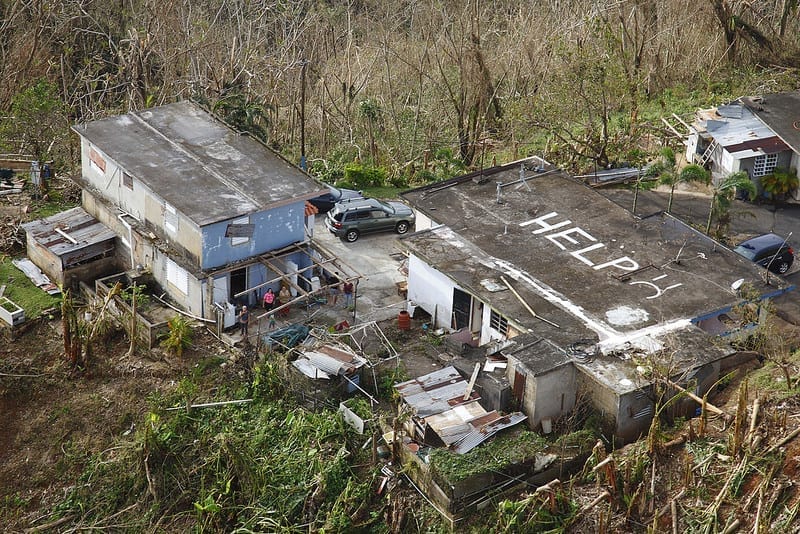With natural disasters becoming more common, severe, and expensive, FEMA says that Americans need to take more responsibility for their own preparedness.
In the second half of 2017, hurricane after hurricane battered the United States. Harvey, Irma, and Maria and other storms together inflicted over $200 billion (and counting!) in damage. Puerto Rico remains a wasteland, many with no electricity, shortages of necessary supplies, and a mounting death toll. In southern California, the Thomas Fire has scorched over 273,400 acres, making it the largest wildfire in California history. Close to 5 million Americans have applied for federal disaster aid since September, and FEMA, like Houston, is sinking.
With the destabilizing climate, we can expect more “100-year” floods and “once-in-a-lifetime” storms just as resource depletion, deregulation and an eroding tax base are rendering us far less able to recover afterward. The House of Representatives recently put forth a staggering $81 billion disaster aid package, almost double the $44 billion requested by the Trump administration, and if it’s approved it would mean tens of billions of dollars for FEMA and community programs. Even so, we’re running just to stay in place – or fall behind.
FEMA administrator and Trump appointee, Brock Long, says his organization can’t necessarily be counted upon to help disaster-ravaged Americans. As he explained in a CNN interview this month, FEMA is broke, the disaster relief system is broken, and Americans are going to have to learn to take care of themselves. This fits right in with the apparent Trump agenda to smash the administrative state.
Thank goodness we just got those tax cuts, right? Now poor folks in Miami might be able to buy an extra loaf of bread or can of tuna in preparation for the next hurricane (maybe a miracle will enable those ingredients to feed a crowd!) while the very wealthy can add a screening room and spa to their doomsday bunker. But I digress.
FEMA or no FEMA, it’s wise to be able to take care of yourself and your family should an emergency strike. Americans who agree that preparing for disasters, or “prepping,” is a worthwhile endeavor seem to be split along political lines as far as the best way to go about it.
On the right, there’s a heavy emphasis on survivalist mentality. “Doomsday Prepper” conventions feature guns, gold, silver, shooting workshops, essential oils, and more guns.
On the left, there’s more of an emphasis on working together than on rugged individualism. In the Transition movement especially, preparing for an uncertain future means networking with neighbors, building skills, and becoming more resilient together.
In Transition 2.0: a story of resilience and hope in extraordinary times, posted by TransitionTowns.
One area where the left and right as well as FEMA all agree is that government, especially now, cannot be trusted to swoop in and help Americans in their moment of greatest need. One look at the ruins of Puerto Rico and it’s easy to see the wisdom in making some general preparations for your household based upon the disasters that are likeliest to occur in your area, whether that is a tornado, epic blizzard, or even being laid off from your job.
There are plenty of websites devoted to novice preppers. This one suggests keeping two weeks’ worth of supplies on hand, including enough food and water for every family member and any pets you have. You may also want to invest in serious first-aid kits (for home and car), a hand-crank or solar-powered radio, light sources, hygiene supplies, and extra medications.
If your emergency scenario involves needing to leave town (or make it home) in a hurry under adverse conditions, consider building a “Bug Out Bag” or “Get Home Bag.” This site lists items to carry in your bag, including shelter, edibles, tools, and covers common mistakes to avoid.
If you trust the government enough to entertain official prepping suggestions, you can check them out here.
Although we may disagree on what’s happening and why, there’s no reason not to look at preparedness from all sides, take the best tips from every source, and put together a plan that’s right for you and your family. You can stock a storage area with extra food – AND make plans for community resilience with your neighbors. That way, when disaster strikes and FEMA says ¯\_(ツ)_/¯, you have as many bases covered as possible.
Have a happy and safe New Year from all of us at Legal Reader!
Related: Winter Preparedness, Pt. 1: What to Wear


Join the conversation!